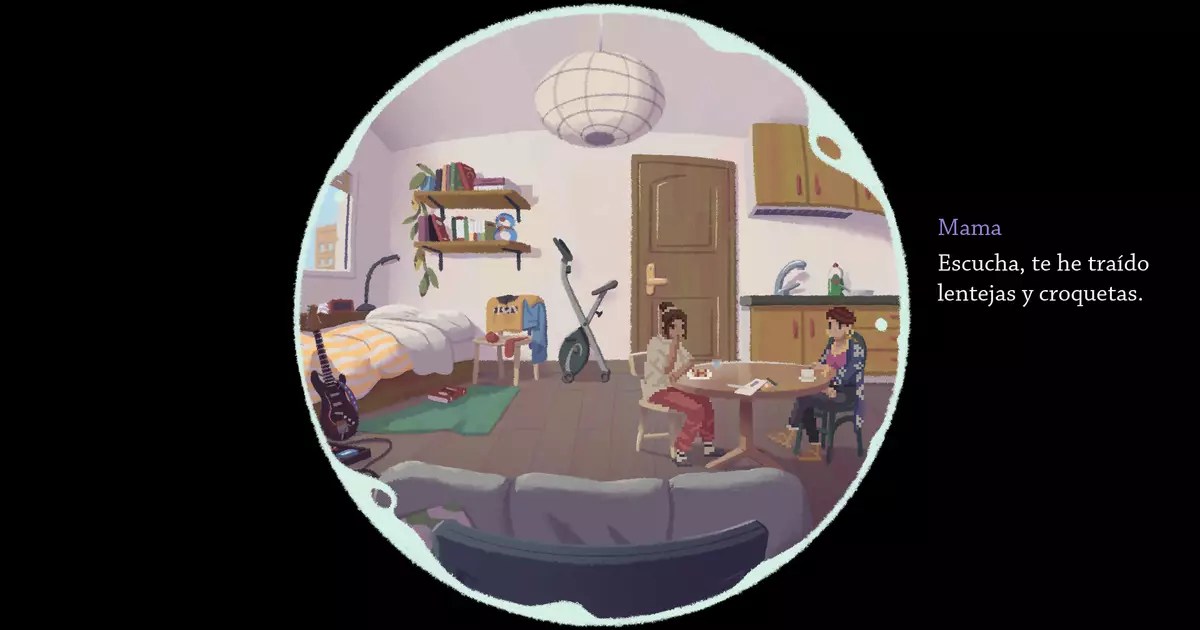“Vendrán Las Aves” (translated as “The Birds Will Come”) stands as a significant addition to the indie gaming landscape, ingeniously reflecting the struggle against burnout. Designed by the talented trio of Francisco Riolobos, Chuso Montero, and Deconstructeam, the game is described as a “slice of life tamagotchi” that navigates the delicate nuances of recuperation through a minimalist gameplay structure. The Valencia-based developers, renowned for their previous works like “The Red String Club” and “The Cosmic Wheel Sisterhood,” are known for their ability to weave emotional depth into gameplay. This free download on Itch.io offers players a unique glimpse into the life of an individual recovering from the pressures of a demanding work environment.
At its core, “Vendrán Las Aves” immerses players in the ordinary life of a character who has recently abandoned a stressful job, armed with a new guitar yet burdened with exhaustion. The decision to purchase a guitar symbolizes hope, yet the weight of burnout lies heavy, creating a poignant juxtaposition. The player’s participation is essential for the protagonist’s journey, emphasizing the role of everyday decisions in managing mental health.
Within the game, players engage in a simple yet profound resource allocation system. The protagonist wakes each day with a certain amount of energy points, which must be wisely distributed among various tasks — eating, resting, indulging in entertainment, or tackling chores. This system underscores the importance of balance in daily life, especially for someone grappling with burnout.
Heralding a sense of realism, the gameplay is often unpredictable; some days may only afford the energy for ordering takeout or mindlessly scrolling through screens, creating a relatable feeling of inertia that many experience during tough times. In navigating this daily cycle, players contribute to a gradual recovery where small victories matter. The notion that tomorrow is another chance mirrors real life, where progress often comes in tiny increments rather than sweeping changes.
A thought-provoking aspect of “Vendrán Las Aves” is its undercurrent of social connection. The game’s design subtly supports the idea that seeking help from others is vital for recovery. When family members, like a caring mother who brings homemade food, make an appearance in the protagonist’s life, they contribute positively to mental well-being by freeing up energy points for other activities. This interaction speaks volumes about the nature of human relationships and their pivotal role in navigating tough times.
In many respects, the game is a reflection of reality; burnout is rarely an isolated phenomenon. The veiled criticism of corporate culture suggests a deeper commentary on the structures that create overwhelming pressure, a theme echoed in conversations about mental health today. Yet the narrative remains optimistic, focusing on the protagonist’s love for music, which stands as a potential beacon of resilience.
While the game draws parallels with the tamagotchi genre, it evokes closer similarities to interactive narratives like Zoe Quinn’s “Depression Quest.” Both titles aim to encapsulate the struggle with mental health, yet “Vendrán Las Aves” thrives on the balance between interactive gameplay and a deeply personal story. The choice of a digital pet metaphor, while enticing, may raise questions about the complexity of emotional support animals versus the simplistic representation of their digital counterparts.
The game’s unique setting—a solitary one-room apartment—invites players to contemplate the existential worries of isolation in contemporary society. The sense of futility and the awareness of the external world can amplify feelings of helplessness during burnout, reflecting the often invisible struggles individuals face behind closed doors.
A Journey Not Without Limits
Despite its uplifting essence, it’s crucial to acknowledge that “Vendrán Las Aves” does not serve as a mental health manual. Instead, it portrays a slice of life, capturing the complexity of recovery without promising definitive solutions. Rather than providing a neatly packaged resolution, it echoes the enduring nature of recovery, reiterating that healing is a journey, steeped in trials and tribulations.
“Vendrán Las Aves” resonates on levels that many players find familiar, particularly those who have traversed the labyrinth of burnout. By engaging with the everyday small wins of the protagonist, players can achieve an understanding of shared experiences, reinforcing the notion that while the struggles may be private, the sentiments are universal. This game invites exploration, empathy, and ultimately, the belief that brighter days are ahead—if only one is willing to seek them.


Leave a Reply